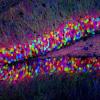Right now I'm taking "Nature's Bounty" lactobacillus acidophilus, which I grabbed because it was on crazy sale last time I was picking up scripts at the pharmacy. The poor little devils were probably all dead before I opened the jar

Based on some older threads I read last night, I think I'll probably get some
Nature's Way Primadophilus the next time I place an iHerb order. It seems like a good value for the quality. It seems pretty clear that
Theralac is the Cadillac of probiotics, but it's 3x more expensive.
I'm not sure if the exact strain composition is really that critical. It seems that the families have fairly similar properties in a lot of ways, so getting both lacto and bifido is probably a good place to start until there's been more conclusive research.
Here's a few more studies about neurotransmitters:
Synthesis of gamma-aminobutyric acid by lactic acid bacteria isolated from a variety of Italian cheeses.
Siragusa S, De Angelis M, Di Cagno R, Rizzello CG, Coda R, Gobbetti M.
The concentrations of gamma-aminobutyric acid (GABA) in 22 Italian cheese varieties that differ in several technological traits markedly varied from 0.26 to 391 mg kg(-1)...Lactobacillus paracasei PF6, Lactobacillus delbrueckii subsp. bulgaricus PR1, Lactococcus lactis PU1, Lactobacillus plantarum C48, and Lactobacillus brevis PM17 were the best GABA-producing strains during fermentation of reconstituted skimmed milk.
Production of gamma-aminobutyric acid by Lactobacillus brevis NCL912 using fed-batch fermentation.
Li H, Qiu T, Huang G, Cao Y.
A simple and effective fed-batch fermentation method was developed for Lb. brevis NCL912 to produce gamma-aminobutyric acid. The results reveal that Lb. brevis NCL912 exhibits a great application potential in large-scale fermentation for the production of gamma-aminobutyric acid.
I'm not sure if these neurotransmitter studies really mean much...after all, these bacteria exist in the stomach, and most neurotransmitters can't cross the BBB. However, there are studies showing a central effect, and this one demonstrates a pathway:
Ingestion of Lactobacillus strain regulates emotional behavior and central GABA receptor expression in a mouse via the vagus nerve.
Bravo JA, Forsythe P, Chew MV, Escaravage E, Savignac HM, Dinan TG, Bienenstock J, Cryan JF.
There is increasing, but largely indirect, evidence pointing to an effect of commensal gut microbiota on the central nervous system (CNS). However, it is unknown whether lactic acid bacteria such as Lactobacillus rhamnosus could have a direct effect on neurotransmitter receptors in the CNS in normal, healthy animals. GABA is the main CNS inhibitory neurotransmitter and is significantly involved in regulating many physiological and psychological processes. Alterations in central GABA receptor expression are implicated in the pathogenesis of anxiety and depression, which are highly comorbid with functional bowel disorders. In this work, we show that chronic treatment with L. rhamnosus (JB-1) induced region-dependent alterations in GABA(B1b) mRNA in the brain with increases in cortical regions (cingulate and prelimbic) and concomitant reductions in expression in the hippocampus, amygdala, and locus coeruleus, in comparison with control-fed mice. In addition, L. rhamnosus (JB-1) reduced GABA(Aα2) mRNA expression in the prefrontal cortex and amygdala, but increased GABA(Aα2) in the hippocampus. Importantly, L. rhamnosus (JB-1) reduced stress-induced corticosterone and anxiety- and depression-related behavior. Moreover, the neurochemical and behavioral effects were not found in vagotomized mice, identifying the vagus as a major modulatory constitutive communication pathway between the bacteria exposed to the gut and the brain. Together, these findings highlight the important role of bacteria in the bidirectional communication of the gut-brain axis and suggest that certain organisms may prove to be useful therapeutic adjuncts in stress-related disorders such as anxiety and depression.
It's interesting to me that these bacteria can both synthesize GABA directly, and also make changes to the brain's GABA mRNA (the signal molecules responsible for causing GABA production) expression in different regions. This is a fairly new area for serious research, so hopefully the finer mechanisms will be elucidated soon.
And some neuroprotection:
Lactobacillus helveticus and Bifidobacterium longum taken in combination reduce the apoptosis propensity in the limbic system after myocardial infarction in a rat model.
Girard SA, Bah TM, Kaloustian S, Lada-Moldovan L, Rondeau I, Tompkins TA, Godbout R, Rousseau G.
Myocardial infarction (MI) stimulates the release of pro-inflammatory substances that induce apoptosis in the limbic system. Pro-inflammatory cytokines are considered as the root cause of apoptosis, although the mechanism is not fully explained and/or understood at this time. In addition, depression may induce gastrointestinal perturbations that maintain the elevated levels of pro-inflammatory cytokines. It has been shown that some specific probiotic formulations may reduce gastrointestinal problems induced by stress and the pro/anti-inflammatory cytokine ratio. Therefore, we hypothesised that probiotics, when given prophylactically, may diminish the apoptosis propensity in the limbic system following a MI. Male adult Sprague-Dawley rats were given probiotics (Lactobacillus helveticus and Bifidobacterium longum in combination) or placebo in their drinking-water for four consecutive weeks. A MI was then induced in the rats by occluding the left anterior coronary artery for 40 min. Rats were killed following a 72 h reperfusion period. Infarct size was not different in the two groups. Bax/Bcl-2 (pro-apoptotic/anti-apoptotic) ratio and caspase-3 (pro-apoptotic) activity were reduced in the amygdala (lateral and medial), as well as in the dentate gyrus in the probiotics group when compared with the placebo. Akt activity (anti-apoptotic) was increased in these same three regions. No significant difference was observed in Ca1 and Ca3 for the different markers measured. In conclusion, the probiotics L. helveticus and B. longum, given in combination as preventive therapy, reduced the predisposition of apoptosis found in different cerebral regions following a MI.
And a few on the so-called "gut-brain axis" in general:
Is there a 'gut-brain-skin axis'?Acne vulgaris, probiotics and the gut-brain-skin axis - back to the future?And here's some threads about probiotics in general: [
1] [
2] [
3] [
4]
Edited by chrono, 15 November 2011 - 05:15 AM.






















































